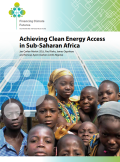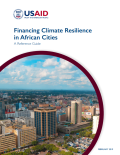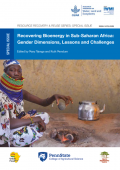This report, Inclusive Climate-Smart Finance – Reaching those most in need shows how properly designed and executed climate-smart finance mechanisms can address socio-political imbalances that reduce communities' resilience to the impacts of climate change and can help redress gender imbalances.

This report takes an in-depth look at the challenges and opportunities to provide clean energy access in sub-Saharan Africa.
This assessment, Global Environment Outlook 6: Regional assessment for Africa , is founded on the understanding that Africa has the potential to significantly contribute to the world economy and to ensure healthy living conditions for its citizens. It also recognizes the abundant natural assets that the region possesses, and the various threats they face.

This reference guide, Financing Climate Resilience in African Cities, from the USAID-funded Adaptation Thought Leadership and Assessments (ATLAS) project provides an overview of the wide range of finance mechanisms available to governments to fund climate resilience initiatives at both the national and local level. The guide also outlines the opportunities and challenges for municipal governments in sub-Saharan Africa to use select finance mechanisms to provide for their citizens needs as cities grow and the climate changes, providing illustrative interventions to increase the change of each mechanism’s success.

This publication focuses on the management of the nexus of energy, food and natural resources in sub-Saharan Africa, with a clear focus on gender roles and implications. It presents case studies that showcase a range of options available to improve biomass use, especially in locations and among populations who currently depend on conventional fuels like firewood or charcoal. Although many of these options are context specific, the provided examples demonstrate that generalizable options exist to improve energy access, reduce waste, protect our soils and empower women.
